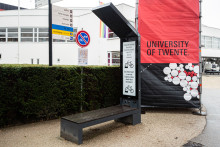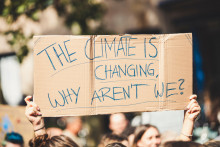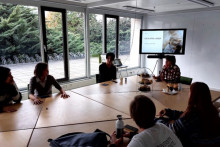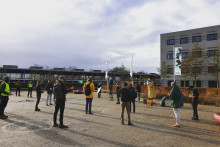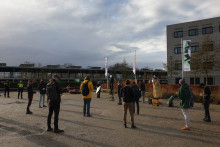On October 31, University Rebellion protested the removal of bicycle racks from O&O square. As we heard about frustrations of many students shared by us, and because this is part of wider patterns of decision making, we were ready to protest. We collected opinions of students and staff about the removal of the bicycle racks via survey.
We received 439 responses to our survey – a data set every psychology bachelor student would dream of. On O&O square, we displaced the results which indicate that 88.8% of respondents do not like the removal of bicycle racks and only 3.4% of respondents think that they had a say in the decision-making. Respondents left comments like ‘annoying’, ‘unnecessary’, or ‘a terrible idea’. Many left longer comments voicing their dissatisfaction with the poor planning of the new parking situation, the way the decision was communicated, and the failure to take their opinions and needs into account. Thus, the survey results reveal that most people on campus are dissatisfied with this decision of UT’s management and think that they did not have say in the process.
According to U-Today, the bike parking at O&O square was discussed multiple times between Executive Board (EB) and University Council (UC). The measure was first squeezed into a broader topic on redesigning the square, following ITC faculty’s move to campus. Eventually, UC was allowed to advise on the matter. This process cannot be called democratic, as democracy required decision-making power and not merely an advisory role of ‘democratic’ bodies. Moreover, communication of the decision showed disregard for information needs of UT’s communities. It was only communicated via a screen on O&O square and stewards that parking was no longer allowed there – without providing any reasons.
Only after several students reached out to Campus Facility Management the decision was explained by email. Most people feel they did not have a say in the process because they did not have a say. We were offered seats at a table with EB by their spokesperson to bring in surveyed interests to influence policy making – behind closed doors. But we are unwilling to engage in undemocratic decision making. For us, the process points to a broader pattern of how decisions are taken at UT.
Only few people at UT participate in taking decisions affecting UT’s communities. UT’s so-called democratic structures are not democratic. Important decisions are taken behind closed doors without transparency about which needs and interests affected decisions and how they have been weighted. This holds true for issues about sustainability at UT, like ties to fossil-fuel industries. After Sustainability Dialogues, EB has taken decision-making away from UT’s communities and behind the closed doors of the Strategic Board. Thus, UT’s communities had no say in the actual decision-making process.
Even worse, EB refuses to establish transparency about how and why decisions are being made. On request, EB claimed to ‘strive for transparency in the broadest sense of the word. However, minutes of the Strategic Board (SB) meetings are never shared publicly.’ This is an obvious contradiction. Not sharing notes of meetings in which important decisions are taken makes impossible discerning if needs and interests of different parties have been taken into consideration and how they have been weighted. EB’s call to collaboration partners to commit to the Paris Agreement sounds promising at first. But without democratic and transparent processes determining future criteria for collaboration, the committee still risks becoming a PR move without actual consequences. Especially, if the framework would be based only on companies’ ESG reporting it becomes a green-washing machine, as companies can easily claim to be Paris Agreement aligned in their reporting.
Moreover, a ‘learning by doing’ approach for the framework development cannot hide that this issue is too big for decision making by a handful of people behind closed doors. EB did not even commit to a definition of sustainability that could guide their efforts despite a policy brief in which Green Hub Twente proposed a definition developed with help of staff and scientist from multiple faculties. No one has all knowledge needed for sustainability transformations of our societies and institutions. Hence, interdisciplinary collaboration is crucial. EB would do well by recognizing this and transparently democratizing the development of the framework for collaboration partnerships.
Recently, the command-and-control style of taking decisions lead to brutal disregard of needs and interests of UT’s communities as EB’s decision to not prolong any temporary contracts will cost many UT employees their jobs. For this decision, EB did not even pretend to honour democratic structures at UT. This decision was made just before the annual budget discussions in UC. This clearly disregards interests and needs of students and staff.
While EB’s spokesperson told us during our protest on O&O square that no one will be fired and only temporary contacts will not be prolonged, this is just a sleight of hand. For those affected, it does not matter whether they are fired, or their jobs will not be prolonged. By January, they will be unemployed. UT employees understand this and those with temporary contracts can be found inside UT’s corridors looking for the best union to protect their livelihoods. Several of these employees have been hired with options to prolong their contracts and have counted on this happening as they worked hard and well.
To us, it seems that UT’s management is out of touch with the reality of its employees. Maybe they are afraid that if these austerity measures with fabricated urgency would be politicized it would reveal incompetence of a management with payrolls at a level that could make up for several jobs. However, they are lucky that power to end contracts only resides on one side.
Clearly, the careless decision-making at UT it not transparent, not democratic, and leads to outcomes rejected by large parts of UT’s communities, at times directly harming them. Therefore, University Rebellion demands to democratize UT by establishing federated student and staff assemblies open to everyone and which take important decisions affecting UT’s communities.
While EB claims taking everyone’s needs into account would be impossible, it is important to realize that innumerable books have been written on topics such as consensus decision-making or deliberative democracy. However, practicing democratic approaches is at direct odds with the authoritarian mindset inherent in management. If one would truly care about needs of students and staff, there would be a way. It is crucial that we take this way to end the disregards of needs of UT’s students and staff. Democratize the University of Twente!


